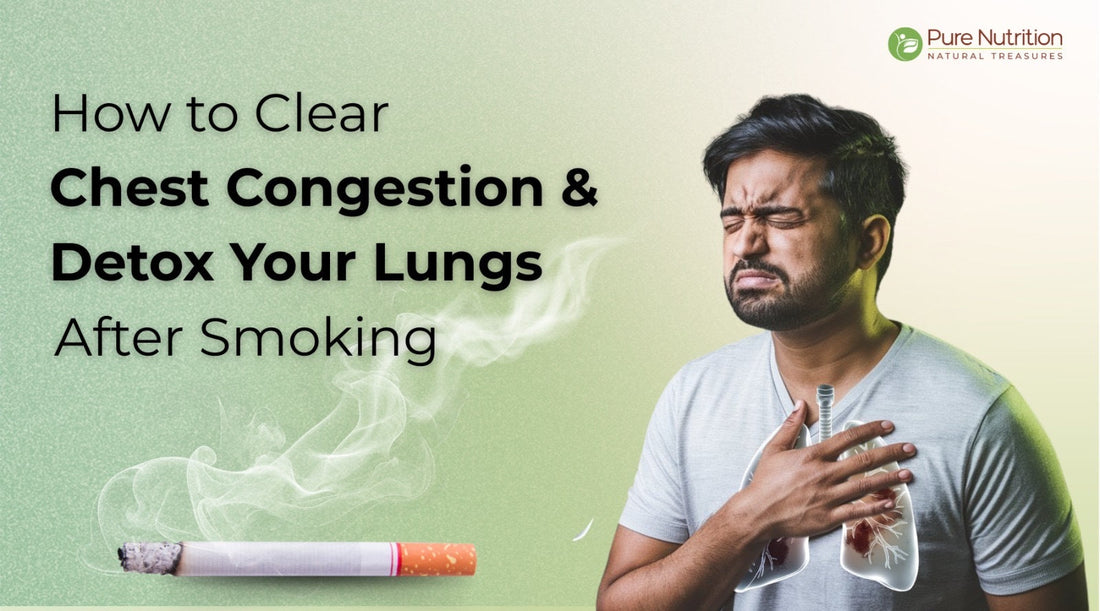
How to Clear Chest Congestion and Detox Your Lungs After Smoking
Introduction
Your lungs work tirelessly every second of the day, filtering out toxins and ensuring that every cell in your body receives oxygen for proper functioning. However, what happens when you smoke? Smoking introduces thousands of harmful chemicals, causing damage that builds up over time. If you've smoked for years or recently quit, your lungs may be struggling with congestion, inflammation, and toxin buildup, giving rise to symptoms that decrease the quality of life.
Why does this happen? When you inhale cigarette smoke, the toxic compounds in it tar, nicotine, and carbon monoxide—accumulate in the lungs. Over time, this damages the delicate lung tissues and weakens the cilia, tiny hair-like structures that are responsible for clearing mucus and debris. This creates friction and compromises the function of the lungs, making people feel tired due to low oxygen supply.
But here’s the good news: your lungs have an incredible ability to heal. By following a targeted lung detox plan, supporting your body with the right nutrition, and using clinically backed supplements with the right combination of nutrients that target congestion and inflammation, you can accelerate the process of healing and breathe better!
Persistent cough or mucus buildup, shortness of breath, even with mild activity, frequent respiratory infections, chest tightness and congestion, decreased endurance are some of the signs that your lung function is getting affected, and action must be taken to support respiratory health.
Let's understand how Smoking Affects the Lungs in detail
1. Toxin Buildup
Cigarette smoke contains over 7,000 chemicals, including formaldehyde, benzene, arsenic, and heavy metals. These toxins accumulate in the lung tissue, leading to inflammation, impairing oxygen exchange, and increasing the risk of chronic respiratory conditions.
2. Cilia Damage
Cilia are microscopic hair-like structures that sweep out mucus, bacteria, and pollutants from the airways. Smoking paralyzes and eventually destroys these cilia, leading to excessive mucus buildup and frequent lung infections. This is why many smokers develop a persistent "smoker's cough."
3. Inflammation & Swelling
The immune system responds to the damage by sending inflammatory cells to the lungs, which, over time, causes inflammation and successive narrowing of the airways, causing breathing difficulties.
4. Increased Mucus Production
As a protective mechanism, thick mucus is produced which gets trapped due to impaired cilia function. This again leads to chest congestion, wheezing, and shortness of breath.
Signs Your Lungs Need Detoxing

Your lungs play a crucial role in filtering toxins from the air you breathe. However, prolonged exposure to pollution, smoking, and other irritants can lead to lung congestion and reduced function. Here are key signs that indicate your lungs need detoxing:
1. Persistent Cough or Mucus Buildup
A chronic cough with mucus may indicate that your lungs are trying to expel toxins and pollutants. Excessive mucus production is a natural defense mechanism, but if it persists, it could signal lung irritation or inflammation.
2. Shortness of Breath
Difficulty breathing or feeling out of breath during simple activities can suggest reduced lung capacity. This can be due to mucus buildup, inflammation, or damage from smoking or pollution. Detoxing your lungs can help improve oxygen intake and overall breathing efficiency.
3. Frequent Respiratory Infections
If you often suffer from colds, bronchitis, or other respiratory infections, it may indicate a weakened lung defense system. Toxins and pollutants can impair the cilia (tiny hair-like structures in your lungs), making it harder to clear out bacteria and viruses.
4. Chest Congestion
Feeling tightness or heaviness in the chest may be a sign of mucus accumulation or inflammation in the airways. This can make breathing more difficult and cause discomfort. Steam therapy, hydration, and breathing exercises can help clear congestion.
5. Decreased Lung Capacity
If you find it hard to take deep breaths or experience fatigue with minimal exertion, your lungs may not be functioning at full capacity. Regular deep breathing exercises, quitting smoking, and avoiding air pollutants can help restore lung health.
How the Lungs Handle Damage and Repair Themselves
Your lungs have an incredible ability to heal, even after years of exposure to harmful substances like cigarette smoke, air pollution, and toxins. While some lung damage may be irreversible, the body has natural mechanisms to repair and regenerate lung tissue over time. Here’s how the lungs handle damage and restore function:
1. Cilia Regeneration
Cilia are tiny hair-like structures in the airways that help clear out mucus, dust, and toxins. Smoking damages these cilia, but after quitting, they start regenerating within weeks, improving the lungs' ability to clean themselves.
2. Mucus Clearance and Detoxification
After quitting smoking or reducing exposure to pollutants, the lungs work to expel trapped mucus and toxins. This can lead to an increase in coughing initially, but it’s a sign that the body is actively clearing out harmful substances.
3. Inflammation Reduction
Smoking and pollutants trigger chronic inflammation in lung tissues, leading to breathing difficulties. Once exposure stops, the body reduces inflammation, allowing the airways to relax and function better. Anti-inflammatory foods and supplements can speed up this process.
4. Cell Regeneration
While lung tissue does not regenerate as quickly as other parts of the body, new healthy cells replace damaged ones over time. Oxygen-rich blood, proper nutrition, and antioxidants support this process.
5. Improved Oxygen Exchange
As lung function improves, oxygen intake increases, leading to better energy levels, improved endurance, and overall respiratory health.
Support Your Lung Recovery
-
Stay hydrated to help clear mucus.
-
Practice deep breathing exercises to strengthen lung capacity.
-
Eat antioxidant-rich foods to support cell repair.
-
Avoid pollutants and secondhand smoke.
- Consider natural lung detox supplements for faster healing.
What Is Lung Detox and how to do it?

Lung detox is the process of naturally supporting your lungs' ability to clear toxins and regenerate healthy tissue. While lungs can detoxify themselves, smoking slows down this process. Lung detoxification and health involve cilia repair, mucus clearance, and cell regeneration. When smoking stops, the cilia start regrowing and regain their function. The lung lining gradually repairs itself, reducing inflammation and ultimately improving oxygen exchange. It's important to support these natural detox mechanisms with good nutrition, breathing exercises, and lifestyle changes.
Sometimes chest congestion generally increases after quitting smoking, and it could be a sign of healing. The lungs start actively clearing out years of toxin buildup, which can cause an increase in phlegm and coughing. The body is actively expelling debris, tar, and irritants. After quitting, your immune system could also trigger an inflammatory response to repair the lung lining. This can temporarily cause mild swelling and irritation, but could be a sign that you are moving towards recovery.
Here are some remedies to smooth your transition and support respiratory health
Quit smoking gradually and make and but make sure you reach the stage of complete distance. Even occasional smoking can slow down lung repair. Water thins mucus, making it easier to expel toxins; hence, hydration becomes important. Another important aspect is workout, especially aerobic exercises that boost exercises boost oxygen intake and lung capacity. Specific breathing exercises like pursed-lip breathing, diaphragmatic breathing, and steam inhalation – Loosens mucus and clears airways.
When it comes to the diet, include antioxidant-rich foods like berries, citrus fruits, and leafy greens to reduce inflammation and protect lung cells. Sulphur-containing foods like onions and garlic can help clear mucus effectively.
Start an Omega-3 supplement to reduce lung inflammation. Finally, choose herbal remedies like ginger, turmeric, tulsi, etc, for speedy recovery. They can help manage inflammation and congestion.
While natural methods help, targeted supplementation can accelerate lung detoxification. Make sure your supplement includes NAC (N-Acetyl Cysteine), curcumin, licorice root extract, and ginger
While detox symptoms like coughing and mild congestion are normal, you should seek medical help if you experience severe shortness of breath, wheezing, or chest pain, and a persistent cough lasting more than 8 weeks.
Your lungs have an incredible ability to heal, and by making the right lifestyle choices and using targeted nutrition, you can 100% restore your respiratory health!
Conclusion
Your lungs have a remarkable ability to heal, but they need the right support. By quitting smoking, adopting a lung-friendly diet, staying hydrated, and practicing deep breathing exercises, you can speed up detoxification and restore optimal lung function. Herbal remedies and targeted supplements can further enhance this process, reducing inflammation and improving respiratory health.
If you’re looking for scientifically backed lung detox solutions, explore Pure Nutrition’s range of premium supplements designed to support respiratory health. Start your lung detox journey today and breathe easier with every step!
Find the best lung detox supplements and take the first step towards healthier lungs!
FAQs
1. How can I improve my respiratory health?
Practice deep breathing, exercise regularly, avoid pollutants, quit smoking, use a humidifier, stay hydrated, and eat lung-friendly foods. Regular check-ups help detect issues early. Maintaining good posture and reducing stress also improve lung function.
2. Why do I feel breathless even though my lungs are clear?
Breathlessness may result from anxiety, heart conditions, low fitness, anemia, allergies, or acid reflux. Hyperventilation and muscle tension can also contribute. If persistent, consult a doctor to rule out underlying health concerns.
3. How long does it take to detox lungs from smoking?
Lung detox starts within days, improving over months. Mucus clears in 1-9 months, and infection risk drops after a year. Full recovery takes years, depending on smoking history. Hydration, exercise, and antioxidants speed up healing.
4. How does air pollution affect the lungs?
Pollution causes inflammation, reduced lung function, asthma, infections, and increased disease risk. Long-term exposure leads to chronic conditions and lung cancer. Wearing masks, using air purifiers, and limiting exposure help protect lungs.
5. Does anxiety cause breathlessness?
Yes, anxiety triggers hyperventilation, muscle tension, and increased heart rate, mimicking respiratory issues. Deep breathing, mindfulness, and stress management can help control anxiety-induced breathlessness. Seek medical advice if symptoms persist.




